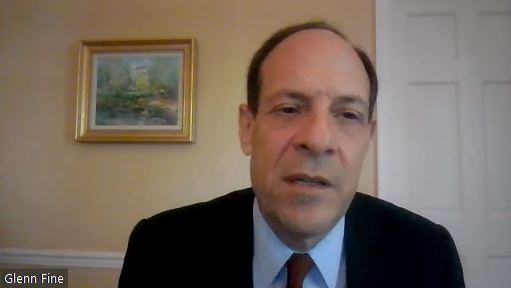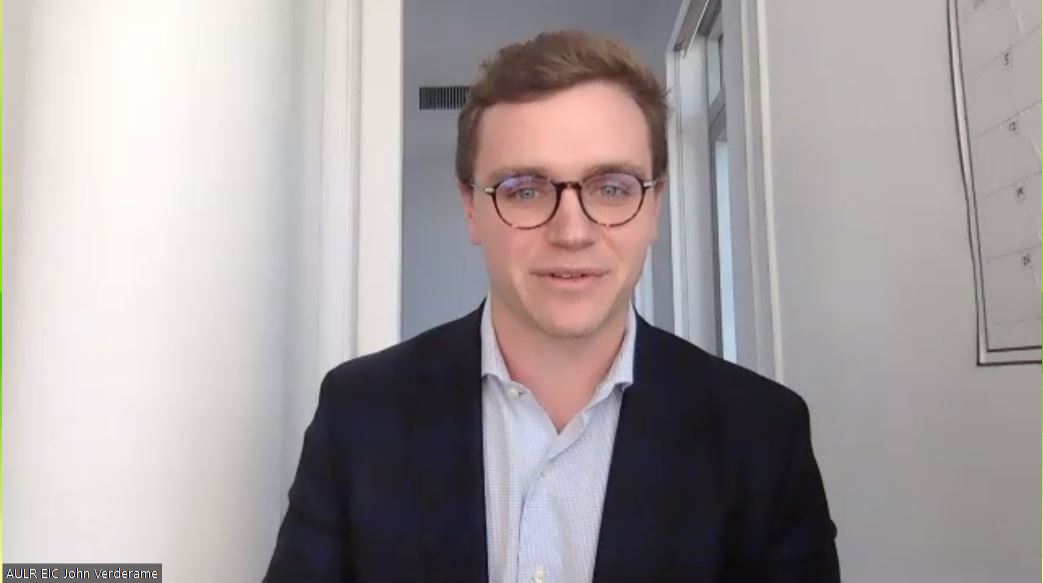AUWCL Hosts Symposium on Government Oversight and Accountability
Nov. 11, 2020
Oct Nov. 6, the Program on Law and Government and the American University Law Review (AULR) hosted a symposium on federal government oversight and accountability, featuring a keynote fireside chat with Glenn Fine, former Inspector General of the Department of Justice and former Acting Inspector General of the Department of Defense.

“Given the prominence of oversight in American law and politics – with everything that has been going on the past couple days – now is more important than ever to cultivate and disseminate scholarship that raises the level of discourse, and provides insights on how to build more efficient and effective systems of oversight,” said AULR Editor-in-Chief John Verderame.
Faculty director of the Program Fernando Laguarda welcomed over 300 attendees to the day-long symposium, which included a panel discussion with professors from across the country on “Structural Adaptive Governance,” as well discussion sessions with professors presenting their recent papers on related topics: the Government Accountability Office’s role in the regulatory state, budget powers within the Trump era, and Inspectors General and oversight independence. Laguarda provided insight from his own paper, “Challenges to the Independence of Inspectors General in Robust Congressional Oversight.”
“There’s no single lens of studying the Inspectors General, which are a unique institution within the Executive Branch – they’re not featured in administrative law textbooks, and research into their work tends to focus on their history or management role rather than their unique function, which I argue in the paper is as an arm of Congressional oversight with all the attendant complexities that ensue,” Laguarda said. Laguarda is the creator of the class “Advanced Topics in Oversight and Accountability.” As part of the seminar, students create and write content for an oversight and accountability blog, The Oversight Project.
“At issue is the theoretical duality of the IG role, furthering congressional interest in independence and accurate information about the working of the Executive Branch, while simultaneously providing additional capacity and expertise to their host agencies,” Laguarda said.

Ann Loeb Bronfman Distinguished Professor of Law and Government Amanda Frost moderated the keynote conversation with Fine, who defined his key roles as IG as identifying waste, fraud, and abuse; promoting effectiveness and efficiency; and ensuring ethical conduct throughout the agencies. When it comes to the possibility of transitioning to a new presidential administration, Fine said Inspectors General are critical.
“IGs understand the operations of an agency, sometimes more than any other remaining individual – while IGs are appointed by the president, they are viewed and should be viewed as non-partisan and non-political, and most have remained as administrations change,” Fine said. “IGs provide institutional knowledge, and their offices understand the agency strengths and weaknesses. I think it’s important for the transition team within each agency to call upon the IG and ask for their expertise, knowledge, and experience. And in the past, that has happened.”
Department of Interior (DOI) Deputy Inspector General Caryl Brzymialkiewicz closed the symposium with a conversation on the importance of data to maintain effective oversight, featuring DOI Data Unit Director Peter Sima-Eichler and Management Program Analyst Charles Haman.
“We should ask, what are the ways we can leverage data to help and support our oversight mission – in fighting fraud, waste, and abuse are you using data or not, and how could you? as the champions for this, you should be asking the ways in which data can amplify or accelerate your work to be better, smarter, or faster,” Brzymialkiewicz.